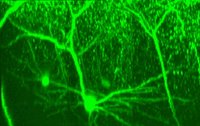Nature vs. Nurture and Materialism
 Oxford University pharmacologist Susan Greenfield was interview by ABC Radio's "Science Friday" on a wide spectrum of neuroscience topics, including free will, nature versus nurture, adult neurogenesis, the genetics of depression, fMRI and the law, and neuroscience as materialism.
Oxford University pharmacologist Susan Greenfield was interview by ABC Radio's "Science Friday" on a wide spectrum of neuroscience topics, including free will, nature versus nurture, adult neurogenesis, the genetics of depression, fMRI and the law, and neuroscience as materialism.One of the most interesting parts of the discussion, paraphrased below, was triggered by the question, "What is the current state of the argument between nature and nurture?"
"We now know that there is a strong interaction. A gene - all a gene is - is something that makes a protein, but it makes more than one protein - it makes tens of thousands of different proteins. They then will switch on or trigger other genes to be switched on or off. [So] you can't really disentangle the interaction between nature and nurture. And then, the big issue is what those proteins are doing - those big chemicals. They don't have 'good housekeeping', or 'being witty' trapped inside them. So you can't have a gene equals a protein equals 'good housekeeping', or 'dignity', or something like this. It's really much more interesting than that."
And later, when asked to respond to the idea that neuroscience represents a kind of ultimate materialism:
"I would query what the alternative to [neuro-materialism] would be. If it's not the physical brain, what else could it be? An emotion floating out there in the ether? I think the problem, and why it seems repugnant to many, and difficult to accept for most, is that 'nothing-but-ism'. I do embrace materialism, but not 'nothing-but-ism.'
"The mind is more than merely the brain. There's a difference - we can reduce your body to ten cents worth of chemicals, or something like this, which it may well be, but we know when you put things together there's things called emergent properties where the whole is more than the sum of the parts. So imagine you're drawing half a circle, a straight line and two dots. If you configure them in a certain way, you'd have a face because of the relation between those elements. Nothing has been added, but by a certain pattern, they are more than just 'nothing-but' a line and a couple of dots: they're a face.
"We know that in the brain, although you can reduce it to chemicals, genes and brain circuits, the way they are put together - in ways that we poorly understand at the moment - result in these emergent properties."


0 Comments:
Post a Comment
<< Home